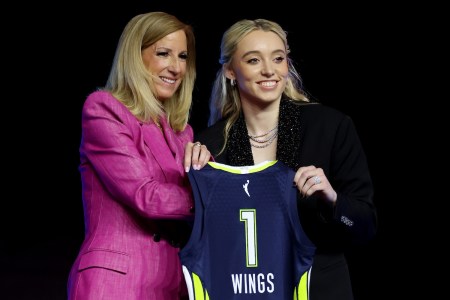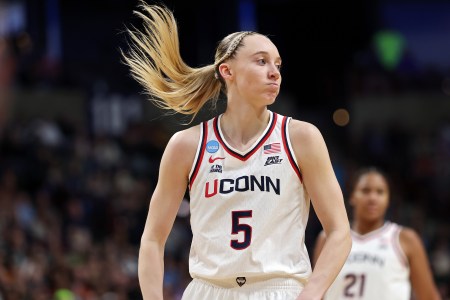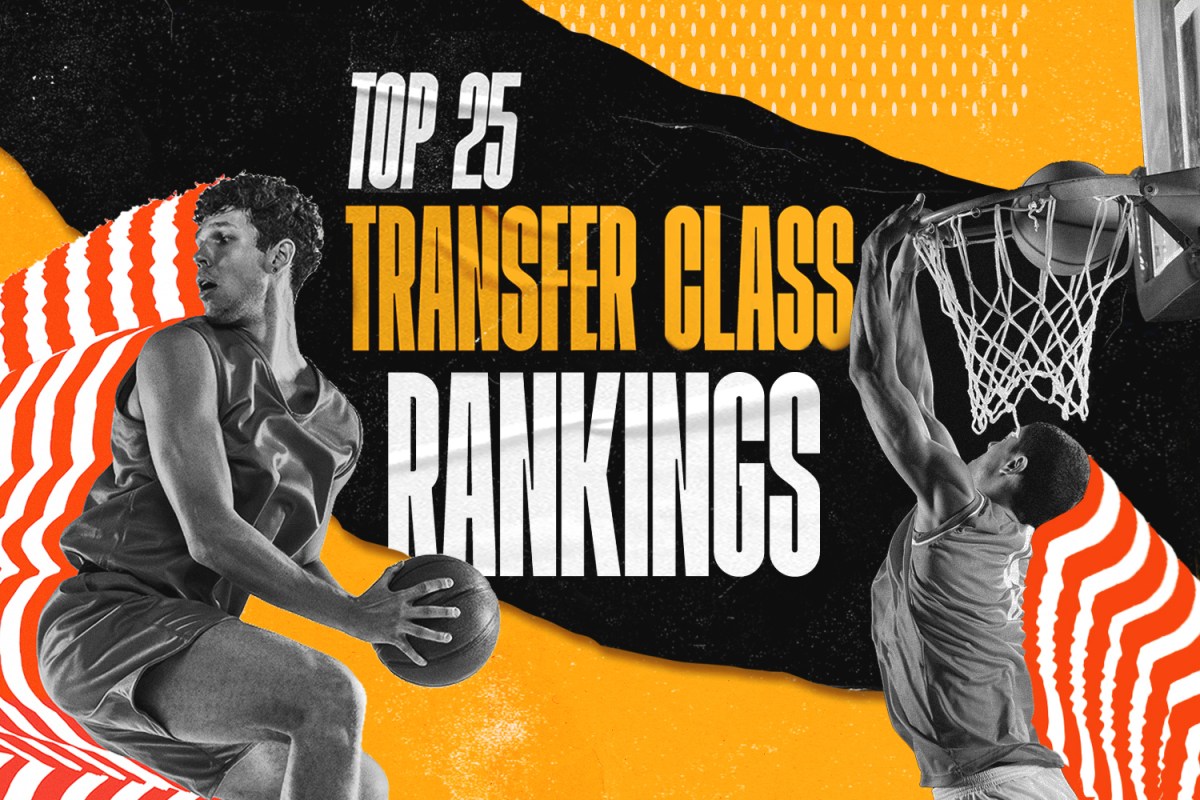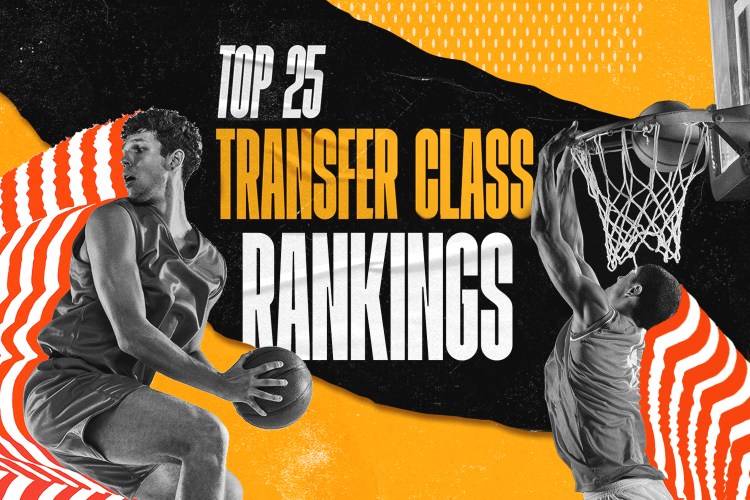Warning: This story discusses child abuse, depression, self-harm, suicidal ideations and sexual abuse.
For most of her life, Harmoni Turner thought God was punishing her. For what, she was never quite sure. Her twin brother died in childbirth and his absence hung in the air like a cold fog. Turner likes to imagine what he might have looked like, to laugh at the inside jokes they might have shared. But as a child his death was a weapon used against her. Turner’s birth mother often told her that she wished Harmoni had died and he had lived. The abuse Turner suffered comes back to her in flashes. The simplest things trigger memories she wishes she could forget, the kind no child should experience, much less remember.
Turner carries that pain with her today, but she hides it well. The 5-foot-10 senior guard is coming to the end of her senior season at Harvard. She averages 21.6 points per game, which is 12th in the nation. Turner is a three-time All-Ivy League selection and was just named the league’s Player of the Year. This weekend, she will try to lead the Crimson to an Ivy League Tournament championship and its first NCAA Tournament bid since 2009.
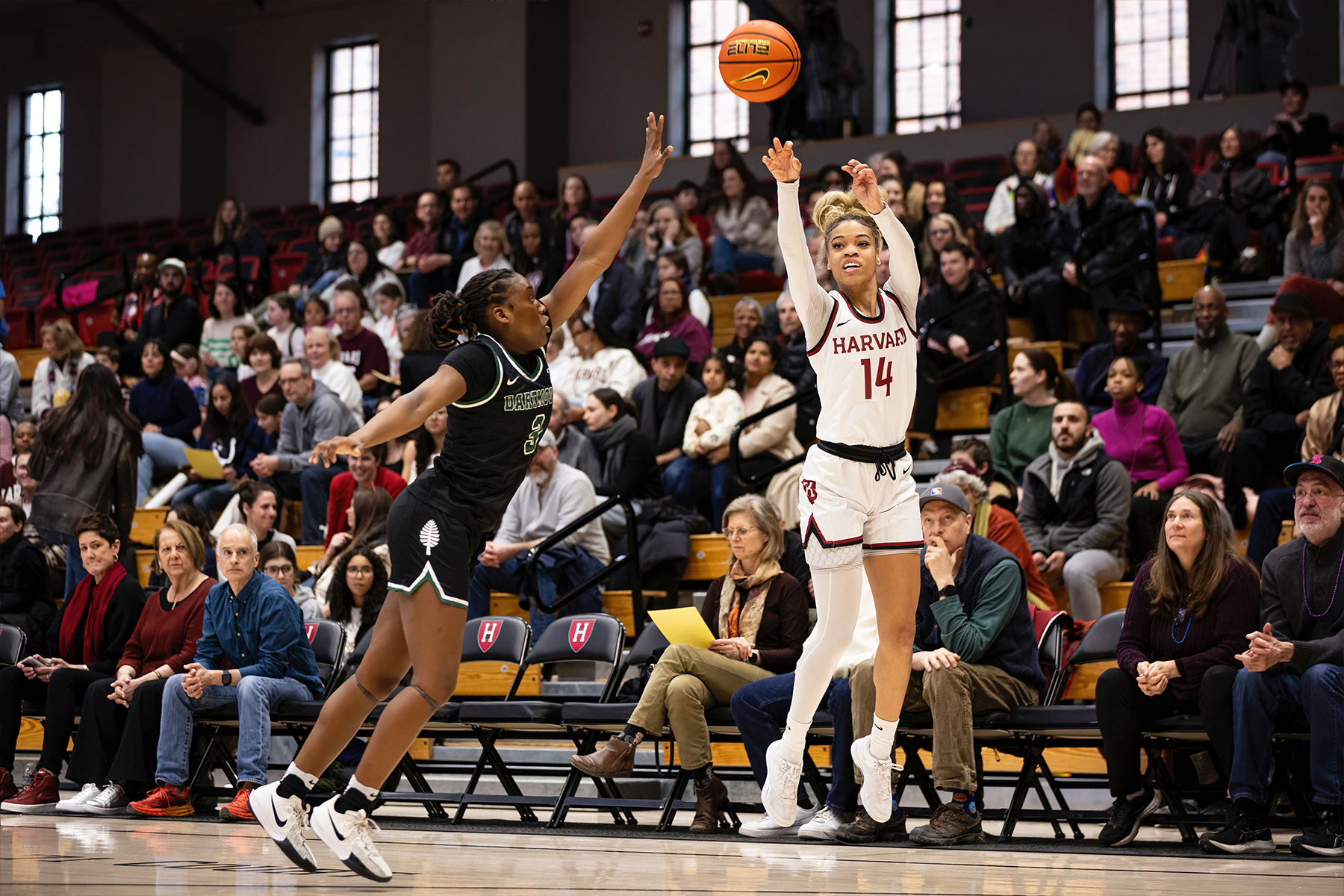
As a consensus five-star recruit at Mansfield Legacy High School in Mansfield, Texas, Turner was recruited by just about every SEC school and many other power conference programs. She turned them all down because she wanted a Harvard education. To outsiders, it looked like she was living the ideal life, but inside, she carried a lot of pain from those memories. At first, it was easy to hide. But the more she played, the more people wanted to know about the talented guard who chose books over ball.
Turner used to only share the polished parts of her life, giving the world the Harmoni Turner she thought it wanted to see. But eventually, she realized that speaking openly helped her heal. It also gave her an opportunity to use her story — and her platform — to help others. Every time she talked about her trauma, Turner felt emboldened to share a little bit more.
“I’ve asked her, ‘Are you sure you want this? Because once you have the attention, you can’t go back,’” her father, Rocky Turner says. “But once she chooses to flip that switch, it’s going to be incredible. Once that spotlight is on her, and it stays on, her story is going to be bigger and better than anyone she has been compared to.”
For most of her life, Harmoni could only be fully happy on a basketball court. “It feels like I’m ascending from the earth when I play,” she says. “Like I’m in another dimension or something. It feels like home. It feels like I can be myself without judgement.” Harmoni needed that outlet, because when she was young, she didn’t feel any of those things outside the lines.
For the first few years of her life, Harmoni says she and her older sister Lyric experienced psychological and emotional abuse at the hands of their biological mother. When Harmoni was just a toddler, she pulled away completely. Rocky became the primary parent, and while he always left the door open for the girls to have a relationship with their birth mother, she never walked through it. “I didn’t understand why she didn’t love me, why she didn’t want me,” Harmoni says. “Or why she said she wished it had been me that died instead of my brother. I was a happy kid, but I was also deeply depressed.”
Harmoni tried to soothe her pain by bringing joy to others. When she was playing at a friend’s house, her laughter would echo throughout the neighborhood. “She has a natural, God given gift to make the energy around her better,” Rocky says. When she was six years old, a little boy knocked on the door looking for Harmoni. His dog had just died and she was the first person he went to for comfort.
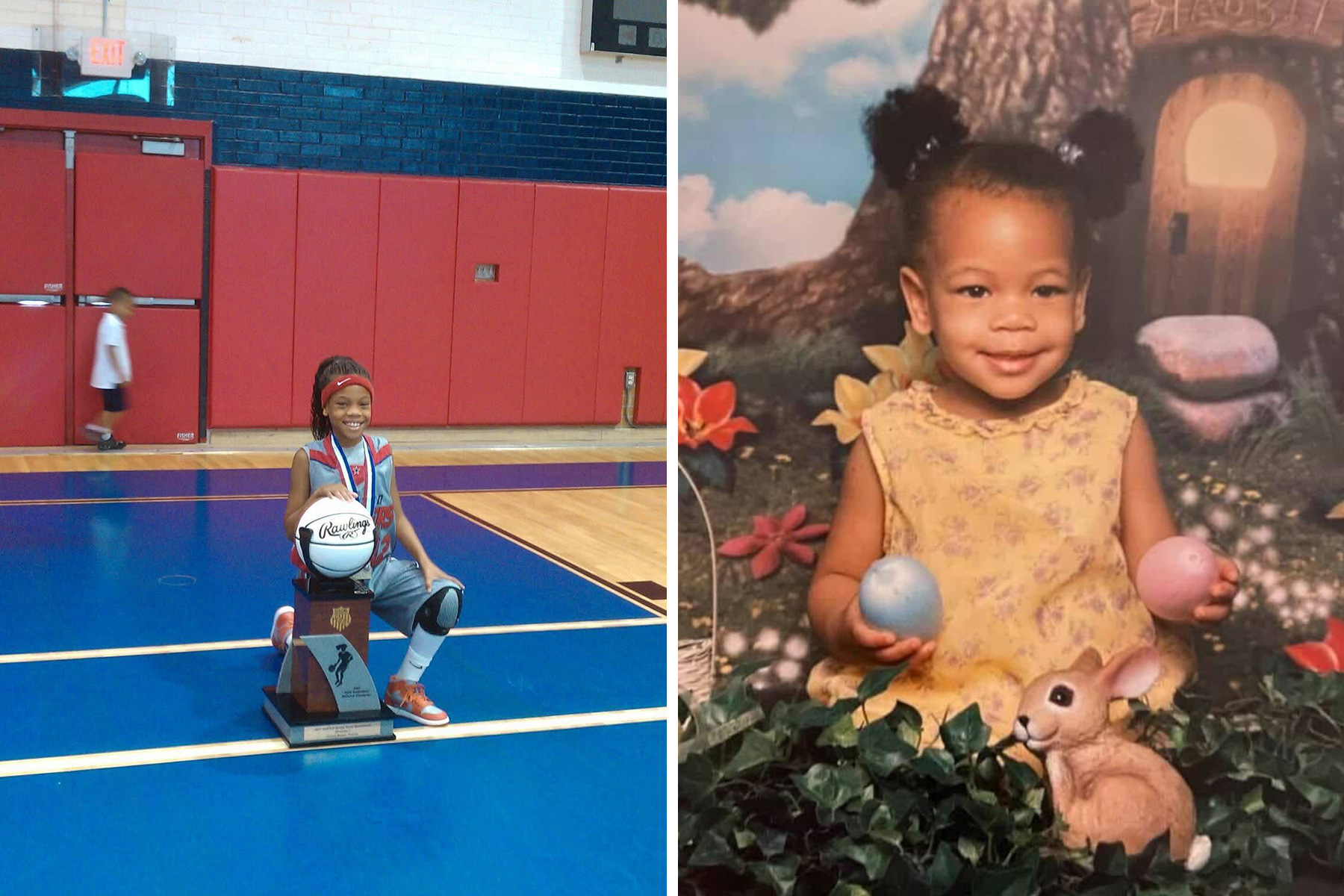
Harmoni saw her biological mother for the last time when she was in fifth grade. She last spoke to her in seventh grade. As Harmoni talks about her birth mother during a recent interview in the Harvard players’ lounge, she shrinks into the chair, hugs one leg into her chest and rests her chin on her knee. “There was never any remorse from her,” she says. “Like damn, she really didn’t want us.”
When Harmoni was four years old, she met Krystal, whom her dad cautiously introduced as his “new friend.” On the day of their meeting, Krystal sat in her car for 20 minutes before mustering up enough courage to go inside. She knew if the girls didn’t like her, the relationship was over. When Rocky called his daughters into the living room, Harmoni rolled through the door, doing somersaults and cartwheels before saying hello. Three years later, Krystal and Rocky got married and Krystal took on the role as their mother.
“It didn’t feel like anything was forced,” Krystal says. “And from that first moment, I never thought twice about wanting to be there for them.”
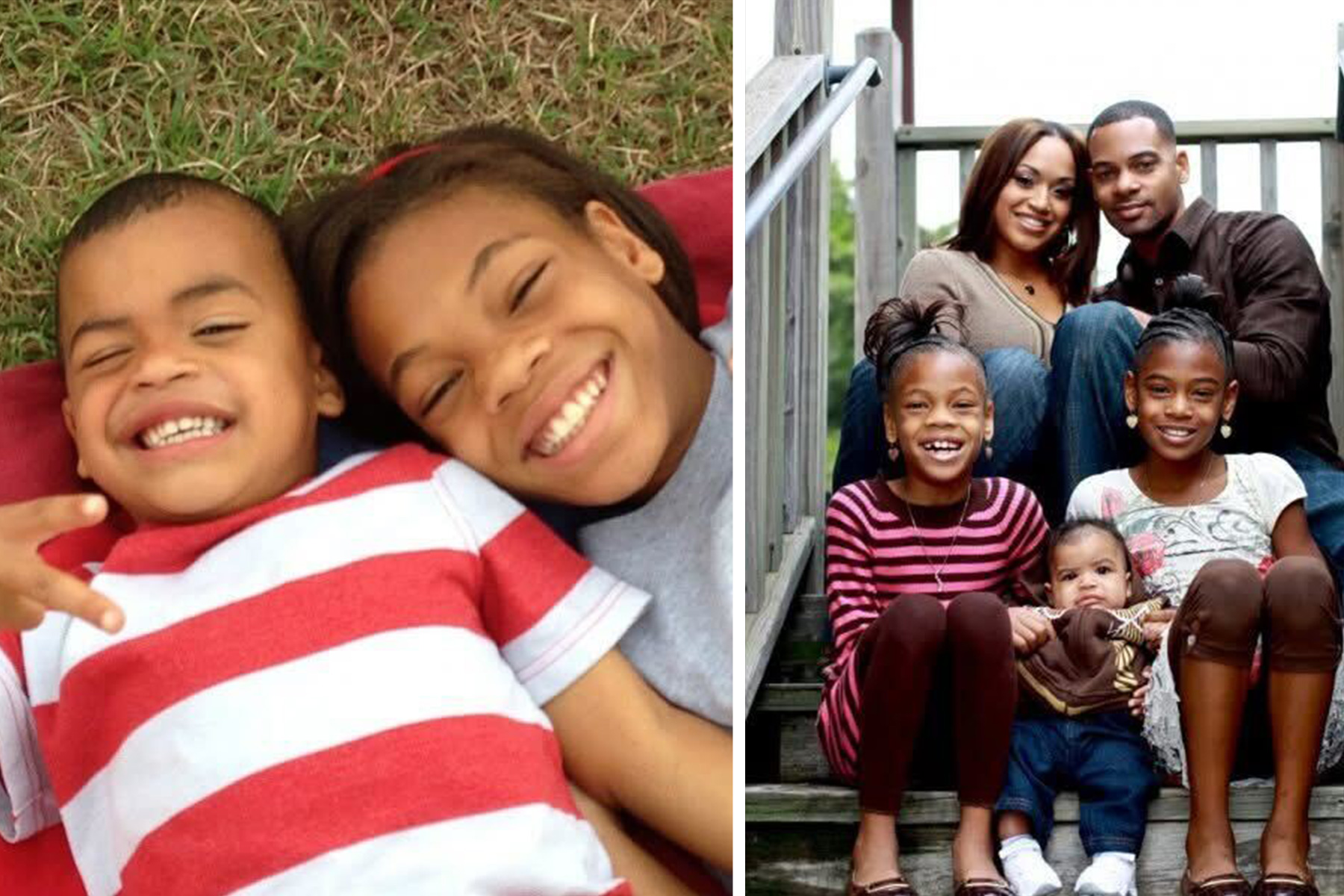
The relationship was especially meaningful for Krystal, who had an abortion in high school. She felt she was too young to have a child, but the decision was agonizing and Krystal prayed for a second chance at being a mother. “With Harmoni being a twin and her twin dying, I feel like God saved her for me,” Krystal says, patting her eyes with a tissue. “So I don’t think I chose her. I think we chose each other. We saved each other, really.”
It was Krystal that first noticed something was wrong. Because Harmoni never talked about how she truly felt for a long time, her parents didn’t know about the abuse. But as she got older, the trauma started to reveal itself. At first, it was little things. Like if a boy at school called Harmoni ugly, she would stew over the words, taking them to heart. She shrugged off compliments, but every criticism pierced her.
Basketball also felt heavier. Three times Harmoni was invited to USA tryouts and three times she was cut. Then during her senior year of high school, right before she committed to Harvard, Harmoni injured her knee and was sidelined for the entire season. “I thought God really must be punishing me for something, because that felt like the most important year of my life and I didn’t get to play,” she says. “It really messed up my confidence, too, because I’d done all this hard work and nothing was paying off.”
Without basketball to keep her mind occupied, Harmoni’s thoughts turned dark. Krystal noticed she started wearing stacks of rubber bracelets on her wrists. Then, when Harmoni began to pull away from her parents, Krystal knew for sure something wasn’t right. “She never shut me out before,” Krystal says. “That’s when I found out she had been cutting and had been doing it for two years.”
The pain of unresolved trauma had gotten overwhelming. Harmoni admitted to Krystal that she didn’t know what else to do to make it stop. Rocky had been out of town, but when Krystal told him what was happening he rushed home while Krystal comforted Harmoni. “I just want to be like you,” Harmoni told her. “You’re always okay. You have everything together.”

The words hit Krystal hard. She had spent so long trying to be Superwoman for her children that Krystal didn’t realize that what Harmoni needed was vulnerability. So she shared her own story. “I told her that I had been molested by two family members when I was young,” Krystal says. “When I said that, she instantly stopped crying and hugged me.” Instead of Krystal consoling Harmoni, they consoled each other.
“Sharing stories is how people find ways to heal,” Krystal says.
Despite the injury, Harmoni set 14 basketball records at her high school including the all-time scoring, assist and rebound records. She also qualified for the U16 and U17 Olympic Trials. When the recruiting process started, Harmoni was set on Texas Tech. It made sense to stay in her home state, playing for a program that felt familiar. Her dad, however, was excited by the idea of her getting a Harvard education. Begrudgingly, Harmoni agreed to a visit. When she arrived on campus it was cold and rainy and most of the team was away for a holiday break. “I was like, ‘Okay, this is literally a sign not to go here,’” Harmoni says.
She had five other visits planned and was ready to put the stuffy school behind her. Rocky had been relatively hands off during the recruiting process, allowing Harmoni to navigate it for herself. But when it came time to decide, he asked her, “Do you trust me?”
“Yes,” Harmoni replied.
“Harvard will be the best thing to happen to you,” he said. She canceled her other visits.
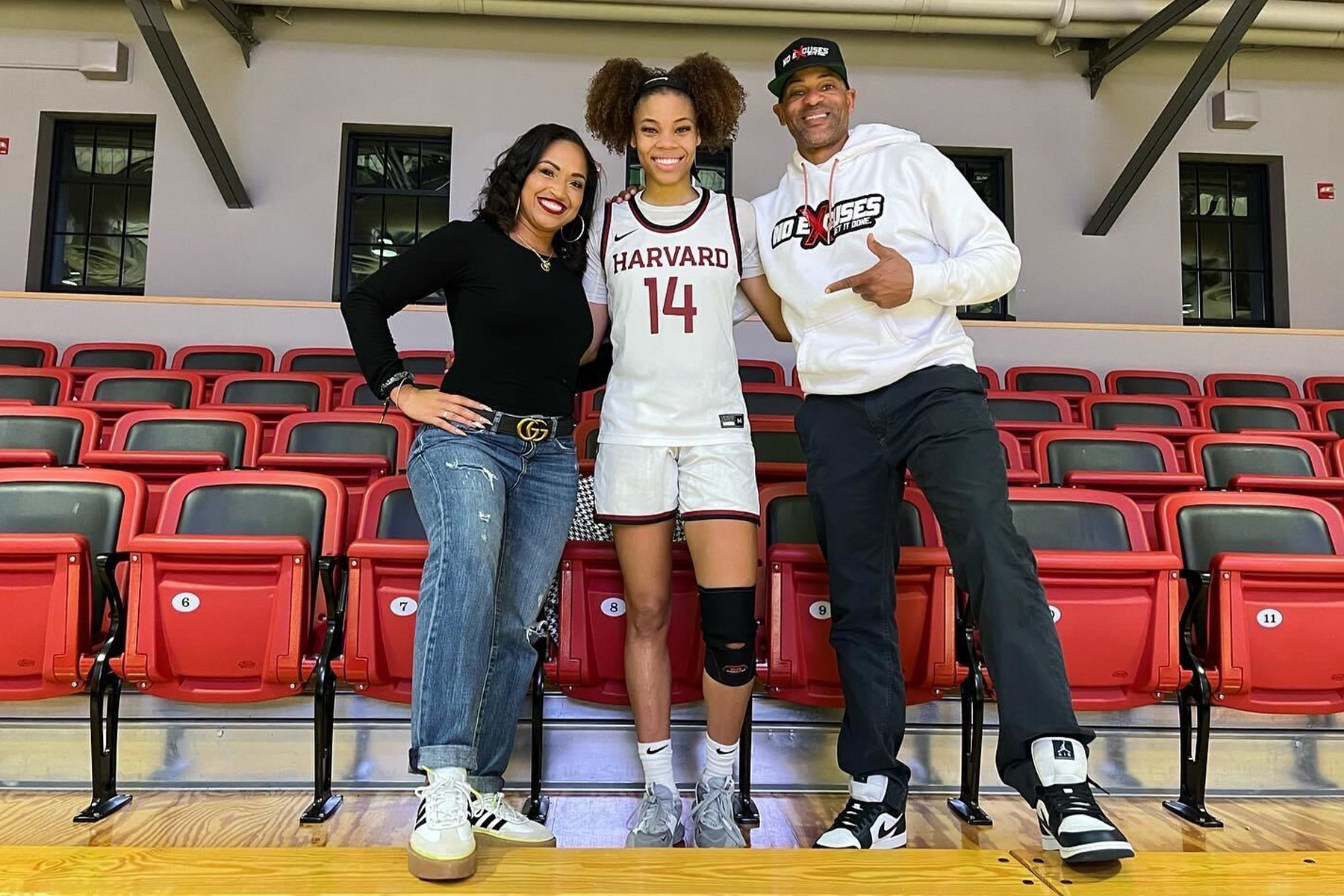
What followed was three years of individual success, but at the same time, Harmoni still led her usual dual life — happy on the court, depressed off of it. During one particularly bad stretch after she reinjured her knee and needed surgery last season, Harmoni made the decision to end it all. “I didn’t want to be here any more,” she says. “Life was just too hard.”
Then, Harmoni had what she describes as a vision. She imagined her funeral and all of the people that would miss her if she was gone. She saw a grownup version of her twin brother, exactly how he would have looked if he had lived. And then she saw her little brother, Rocky Jr. His face made her keep going. Right now, Harmoni is living for them, but she understands how heavy that can be. And someday, she hopes to be living for herself.
“I never want him to feel like he has to do things for me, to keep me here,” she says of Rocky Jr. “I don’t want any of my family to. I want them to do things for themselves, because it’s not fair to put that on them.”
Harmoni’s default approach to dealing with her own pain is helping others relieve theirs. So in the summer of 2023, she and Krystal launched a foundation called Pretty N’ Secure, which mentors young women in Texas, helping them process trauma while setting them up for a better future. This year they helped five girls earn college scholarships. Harmoni has always been better at helping others than she is at helping herself. The foundation allows her to do both at once.
“It’s like I’m going through the program with these girls, ” Harmoni says. “Because I’m not healed yet, but I’m getting there.”
Harmoni is also still working on her relationship with herself. She goes out on solo dates, eating soul food or seafood. She loves a selfcare night, complete with face treatments and one of her favorite TV shows. She watches the shows on repeat — Grey’s Anatomy and Scandal, mostly — because she likes to know what’s coming. It’s a luxury she hasn’t had in her own life.
“It would be easy to give up,” she says. “I understand why people do, but I also understand why people don’t. Because there is a light at the end of the tunnel. Sometimes it’s just hard to see when it’s so damn pitch black.”
By the time she entered her senior season, Harmoni was a well-known commodity inside her league and in the northeast. She finally exploded onto the national scene on Nov. 7, when she and the Crimson walked into Indiana’s Assembly Hall to face the 25th-ranked Hoosiers. Harmoni was the best player that night, terrorizing Indiana with her step-back threes, yoyo-esque crossovers and off-balance layups. She finished with 24 points, 6 steals, four rebounds and four assists as Harvard won 72-68 in overtime.
She followed that up with a Harvard-record 41 points against Boston College and 38 points against Maine. For the first few weeks of the season it was Harmoni, not Ta’Niya Latson, JuJu Watkins or Hannah Hidalgo, who led the country in scoring. And as she continued to score, Harvard continued to win and the spotlight on the senior guard got a little brighter.

When Harvard celebrated Senior Night on March 1, Krystal and Rocky watched as Harmoni’s teammates gave speeches about her impact. One player said she almost quit the team, but Harmoni inspired her to keep going. Others cried, saying they wished Harmoni could stay at Harvard until they graduated. “She used to be kind of on an island.” Head coach Carrie Moore says. “But she has developed really meaningful relationships with her teammates that go beyond wins and losses.”
The Crimson are currently projected as one of the last four teams to earn a spot in the NCAA Tournament, something that hasn’t happened since 2007. And in the spring, Harmoni will graduate from Harvard with a double-major degree in Sociology and African American Studies. As she prepares to leave college for the next chapter, she often thinks of herself as the little girl she used to be.
Krystal has a picture of seven-year-old Harmoni on a basketball court in Texas. It’s one of the many family pictures she loves to show off. An oversized blue mouth guard is stretching out Harmoni’s cheeks like a chipmunk and the gym bag she’s clutching with both hands is weighing her down. Harmoni’s jersey is much too big. The armholes are loose and extending more than halfway down to her waist.

“I wish I could hug her,” Harmoni says of that version of herself. “I’d tell her I’m proud of her, and I’d hold her hand and guide her through this life.”
In high school, Harmoni started writing a book of poetry. It includes thoughts and details of all she has been through and everything she continues to process as an adult. Someday, when the time is right, Harmoni plans to publish the book. It’s part of the battle she is still fighting as she learns to love herself as much as she loves the people around her. “I’m not there yet,” she says. “I’m just fighting every day. I love that about myself. Sometimes I hate it, but today I love it.”



